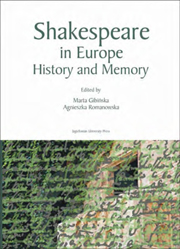Book contents
- Frontmatter
- Contents
- Preface
- Towards a European History of Henry V
- History and Histories
- History and Memory: Criticism and Reception
- History, Memory, and Ideological Appropriation
- Claiming Shakespeare as “Our Own”
- “Must i Remember?:” Hamlet, Memory and Shakespearean Trauma
- Interdisciplinary Shakespeare in the Socialist Republic of Romania. A Comment on Official Censorship and Subversive Practices
- Mingling and Separating in Coriolanus
- “A Goodly House:” Memory and Hosting in Coriolanus
- “Suit the Word to the Action:” Shakespeare's Richard II (2004). A Case of (Meta)Translation?
- “Speak, Memory:” Anniversary Celebrations in the History of the German Shakespeare Society
- Theatre: The Act of Memory and History in the Making
- Index of Authors
Interdisciplinary Shakespeare in the Socialist Republic of Romania. A Comment on Official Censorship and Subversive Practices
from History, Memory, and Ideological Appropriation
Published online by Cambridge University Press: 05 September 2014
- Frontmatter
- Contents
- Preface
- Towards a European History of Henry V
- History and Histories
- History and Memory: Criticism and Reception
- History, Memory, and Ideological Appropriation
- Claiming Shakespeare as “Our Own”
- “Must i Remember?:” Hamlet, Memory and Shakespearean Trauma
- Interdisciplinary Shakespeare in the Socialist Republic of Romania. A Comment on Official Censorship and Subversive Practices
- Mingling and Separating in Coriolanus
- “A Goodly House:” Memory and Hosting in Coriolanus
- “Suit the Word to the Action:” Shakespeare's Richard II (2004). A Case of (Meta)Translation?
- “Speak, Memory:” Anniversary Celebrations in the History of the German Shakespeare Society
- Theatre: The Act of Memory and History in the Making
- Index of Authors
Summary
The word censorship cannot be separated from a scenario of violence and fire. Censorship is traditionally defined as an act coming from the Church or from the State. In the modern sense, it is defined as the use of governmental power to control speech and other forms of human expression. In the daily game of freedom and coercion, what is censored may range from specific words to entire concepts, and the ostensible motive of censorship is to stabilize or improve the society over which the government has control. Censorship is regarded as a typical feature of dictatorships and other authoritarian political systems. Some thinkers understand censorship to include attempts to suppress points of view or ideas such as negative propaganda, media manipulation, or disinformation. But censorship has also become known as a practice that may also give writing an extraordinary impact and credibility.
In an article on censorship and poetry in communist Romania, Adam J. Sorkin notices this inherent paradox – that the more censored one piece of writing is, the more valuable it becomes – summarizing it, symbolically, with the help of a scene from John Milton's Paradise Lost. In Book XII, the Archangel Michael, before expelling Adam and Eve from Eden, promises that the result of the Fall will be something better for man in a future time, when “[…] all this good of evil shall produce, / And evil turn to good; more wonderful / Than that which by creation first brought forth / Light out of darkness!” (XII.469–72). The fortunate fall means that what on the surface is an irremediable catastrophe finally turns to good.
- Type
- Chapter
- Information
- Shakespeare in EuropeHistory and Memory, pp. 205 - 214Publisher: Jagiellonian University PressPrint publication year: 2008



